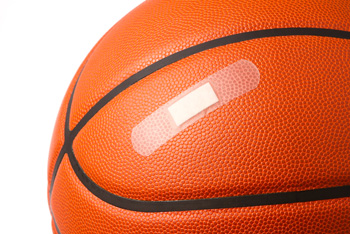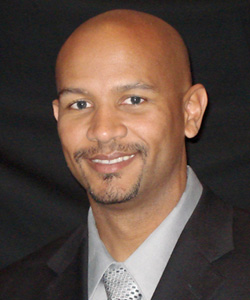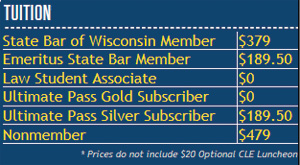 June 19, 2013 – The college basketball world witnessed a gruesome scene when the Louisville’s Kevin Ware snapped his leg in 2013 Elite Eight game against Duke. Afterwards, the question came: Is the school required to pay Ware’s medical bills?
June 19, 2013 – The college basketball world witnessed a gruesome scene when the Louisville’s Kevin Ware snapped his leg in 2013 Elite Eight game against Duke. Afterwards, the question came: Is the school required to pay Ware’s medical bills?
Interestingly, the answer is no, according to Ramogi Huma, president of the National College Players Association (NCPA).
The former UCLA linebacker is a featured luncheon speaker at the State Bar of Wisconsin PINNACLE’s Health, Labor & Employment Law Institute, which will be held Aug. 22-23 at the Kalahari Resort in Wisconsin Dells.
“NCAA rules don’t require schools to pay for sports-related injuries,” said Huma, who will raise a number of hypotheticals for lawyers to ponder in the college sports arena. “There are so many potential legal issues out there. I’m excited to discuss them.”
NCAA rules require member schools to certify that a student-athlete has health insurance to cover sports-related injuries up to $90,000. The school isn’t required to cover bills that exceed minimum coverage amounts, although some schools do.
For instance, UW-Madison’s Athletic Department provides secondary coverage for sports injuries to cover all remaining balances after an athlete’s primary policy amount is exhausted, according to Dennis Helwig, assistant athletic director for sports medicine.
If a student-athlete has no insurance and a financial hardship, UW’s athletic department can pay for the athlete’s school insurance plan. Although the school’s insurance plan excludes sports-related injuries, the athletic department is self-insured to cover them.

“NCAA rules don’t require schools to pay for sports-related injuries,” says Ramogi Huma, president of the National College Players Association. Huma will raise a number of hypotheticals for lawyers to ponder in the college sports arena at the State Bar of Wisconsin PINNACLE’s Health, Labor & Employment Law Institute, Aug. 22-23.
Other schools don’t necessarily have this “safety net,” Huma says. “We want to provide information to recruits so they can make an informed decision. But the vast majority of schools we’ve asked won’t provide it. The schools that do disclose have good policies.”
Huma says the insurance issue is just one of many injustices he is seeing in college sports, especially given the amount of money schools rake in from athletic programs.
For instance, the NCPA is pushing a NCAA-backed program to address concussions, with a pooled fund for injured athletes who need assistance in the future. It also wants the NCAA to remove caps on costs allowed for full athletic scholarships.
Tackling Injustices for Student-Athletes
In 1995, Huma commenced summer football workouts for the UCLA as an incoming freshman. The workouts were “voluntary,” but there was an expectation to be there.
“During orientation, our NCAA compliance officer told us that if we were injured during summer workouts, NCAA rules prohibited UCLA from paying any of our medical bills. There were guys on the team who didn’t have health insurance.”
Huma later found out that NCAA rules didn’t require schools to pay medical bills that result from sports-related injuries during the school-year either. Like a lawyer, he started digging into rules and regulations to pinpoint gaps in protections for student-athletes.
He soon founded NCPA, now with 14,000 members, which lobbies to change NCAA rules on various issues affecting student-athletes, including costs for injuries.
Huma notes that college athletics is a billion dollar industry, and students shouldn’t be stuck with out-of-pocket medical costs incurred while playing college sports.
Joe Forward is the legal writer for the State Bar of Wisconsin. He can be reached by email or by phone at (608) 250-6161.
The California-based NCPA also sponsored the state’s “Student-Athletes Bill of Rights,” signed into law last year, which requires California schools with media revenue over $10 million to pay health insurance premiums for low-income athletes.
“I would like to see a mandate imposed by the NCAA requiring that all schools pay health insurance premiums for qualifying athletes and pay out-of-pocket expenses, including deductibles, to those who are injured playing college sports,” Huma said.
The California law also requires a school to pay out-of-pocket medical expenses for five years after an injury, and requires an athletic program to provide an “equivalent” scholarship if an injured player’s scholarship is not renewed.
In addition, the NCPA wants the NCAA to adopt a plan to reduce concussion-related injuries and use a portion of football media revenues to assist current and former players who experience brain trauma resulting from college sports.
“Some of that money should be directed into a fund to identify and track players to see how they are doing in life after contact sports and provide resources and treatment,” Huma said. “Now is a good time to direct money towards those ends.”
“The NCAA is doing very little to address concussions,” Huma says. “Of all the things that are happening in the NFL, virtually none of it is happening in the NCAA.”
Huma says he’s excited to speak with lawyers in Wisconsin, noting that the judicial system is a powerful tool to address perceived injustices against student-athletes. “I’m not a lawyer, so I can only raise the injustices I see. Lawyers can help us fight.”
Huma noted a pending class-action lawsuit against the NCAA by former college football players who suffered concussions. In Arrington v. NCAA, filed in federal court in Illinois, the plaintiffs say the NCAA “has engaged in a long-established pattern of negligence and inaction with respect to concussions and concussion-related maladies sustained by its student athletes, all while profiting immensely from those same student athletes.”
At least one sports legal commentator, in a recent Forbes article, thinks the NCAA is it hot water here. Unlike NFL players, most all of whom played college football first, “the NCAA cannot so easily try place blame on earlier injuries,” writes Marc Edelman, a law professor and sports business scholar at City University of New York.

About the Health, Labor, and Employment Law Institute
PINNACLE’s second annual Health, Labor, and Employment Law Institute will be held Aug. 22-23 at the Kalahari Resort in Wisconsin Dells. Attendees can earn up to 11.5 CLE credits through 16 breakout sessions. Four plenary sessions are scheduled.
To view the schedule or to register, visit the Institute page on WisBar or call customer service at (608) 257-3838 or (800) 728-7788. Those who book rooms by July 22 will get discounted rates.
